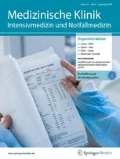Zusammenfassung
Hintergrund
Nichtmedikamentöse Interventionen werden in der Prävention und Therapie des Delirs eingesetzt.
Fragestellung
Überprüfung der Effektivität von nichtmedikamentösen Therapieoptionen.
Methodik
Auswertung von Übersichtsarbeiten und Studien mit Formulierung von Empfehlungen für die klinische Praxis.
Ergebnisse
Hohe Effektivität in der Delirprävention und Therapie haben Reorientierung, Förderung der geistigen Aktivität, frühe Physiotherapie, Vermeidung von Polypharmazie und Schlafentzug sowie adäquate Kommunikation.
Schlussfolgerungen
Nichtmedikamentöse Interventionen haben einen hohen Stellenwert in der Prävention und Therapie des Delirs.
Abstract
Background
Non-pharmacological intervention strategies are used in the prevention and therapy of delirium.
Objectives
Investigation of the effectiveness of non-pharmacological therapy options.
Methods
Analysis of review articles and studies in order to make recommendations for the clinical practice.
Results
Reorientation, promotion of mental activities, adequate communication, early physiotherapy and avoidance of both polypharmacy and sleep deprivation have a high impact on the prevention and therapy of delirium.
Conclusion
Non-pharmacological intervention strategies are very important in the prevention and therapy of delirium.

Literatur
Aurell J, Elmquist D (1985) Sleep in the surgical intensive care unit: continuous polygraphic recording of sleep in nine patients receiving postoperative care. Br Med J 290:1029–1032
Busch-Vishniac IJ, West JE, Barnhill C et al (2005) Noise levels in John Hopkins Hospital. J Acoust Soc Am 118:3629–3645
Ely EW, Shintani A, Truman B et al (2004) Delirium as a predictor of mortality in mechanically ventilated patients in the intensive care unit. JAMA 291:1753–1762
Fong TG, Tulebaev SR, Inouye SK (2009) Delirium in elderly adults: diagnosis, prevention and treatment. Nat Rev Neurol 5:210–220
Hein C, Forques A, Piau A et al (2014) Impact of polypharmacy on occurrence of delirium in elderly emergency patients. J Am Med Dir Assoc 15(850):e11–e15
Heymann A, Spiess CD (2010) Postoperatives Delir und kognitives Defizit – Prävention und Therapie. Anasthesiol Intensivmed Notfallmed Schmerzther 45:112–116
Hospital Elder Life Program (HELP) for Prevention of Delirium. www.hospitalelderlifeprogram.org. Zugegriffen: 24. Nov. 2015
Hu RF, Jiang XY, Hegadoren KM et al (2015) Effects of earplugs and eye masks combined with relaxing music on sleep, melatonin and cortisol levels in ICU patients: a randomized control trial. Crit Care 19:115
Inouye SK (1999) Predisposing and precipitating factors for delirium in hospitalized older patients. Dement Geriatr Cogn Disord 10:393–400
Inouye SK, Bogardus ST, Charpentier PA et al (1999) A multicomponent intervention to prevent delirium in hospitalized older patients. N Engl J Med 340:669–676
Inouye SK, Bogardus ST, Williams CS et al (2003) The role of adherence on the effectiveness of nonpharmacologic interventions. Arch Intern Med 163:958–964
Marcantonio ER, Flacker JM, Wright J et al (2001) Reducing delirium after hip fracture: a randomized trial. J Am Geriatr Soc 49:516–522
Martin J, Heymann A, Bäsell K et al (2010) S3-Leitlinie zu Analgesie, Sedierung und Delirmangement in der Intensivmedizin. Anästh Intensivmed 51:622–631
McCusker J, Cole M, Abrahamowicz M et al (2002) Delirium predicts 12-month mortality. Arch Int Med 162:457–463
Ringaitiene D, Gineityte D, Vicka V et al (2015) Impact of malnutrition on postoperative delirium development after on pump coronary artery bypass grafting. J Cardiothorac Surg 10:74
Schweickert WD, Hall J (2007) ICU-acquired weakness. Chest 131:1541–1549
Schweickert WD, Pohlman MC, Pohlman AS et al (2009) Early physical and occupational therapy in mechanically ventilated, critically ill patients: a randomized controlled trial. Lancet 373:1874–1882
Theuerkauf N, Guenther U (2014) Delir auf der Intensivstation. Med Klin Intensivmed Notfallmed 109:129–136
Wilson MM, Morley JE (2003) Impaired cognitive function and mental performance in mild dehydration. Eur J Clin Nutr 57:24–29
Author information
Authors and Affiliations
Corresponding author
Ethics declarations
Interessenkonflikt
N. Zoremba gibt an, dass kein Interessenkonflikt besteht.
Dieser Beitrag beinhaltet keine Studien an Menschen oder Tieren.
Additional information
Redaktion
M. Buerke, Siegen
Rights and permissions
About this article
Cite this article
Zoremba, N. Delirmanagement in der Intensivmedizin. Med Klin Intensivmed Notfmed 112, 320–325 (2017). https://doi.org/10.1007/s00063-015-0123-y
Received:
Revised:
Accepted:
Published:
Issue Date:
DOI: https://doi.org/10.1007/s00063-015-0123-y

